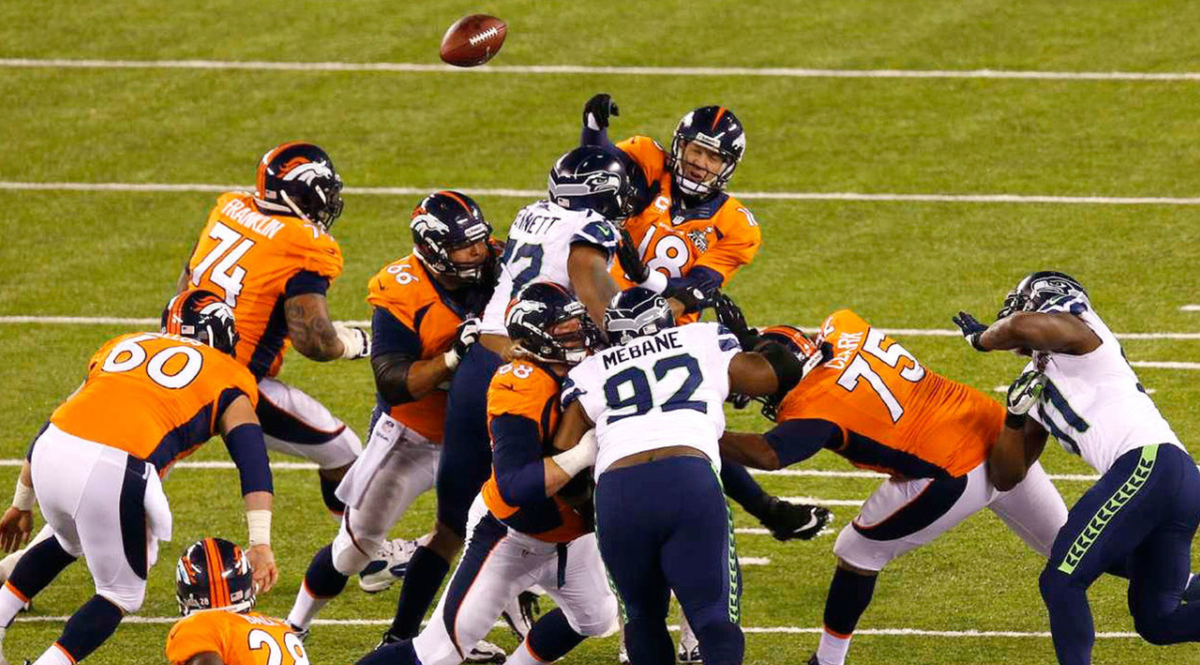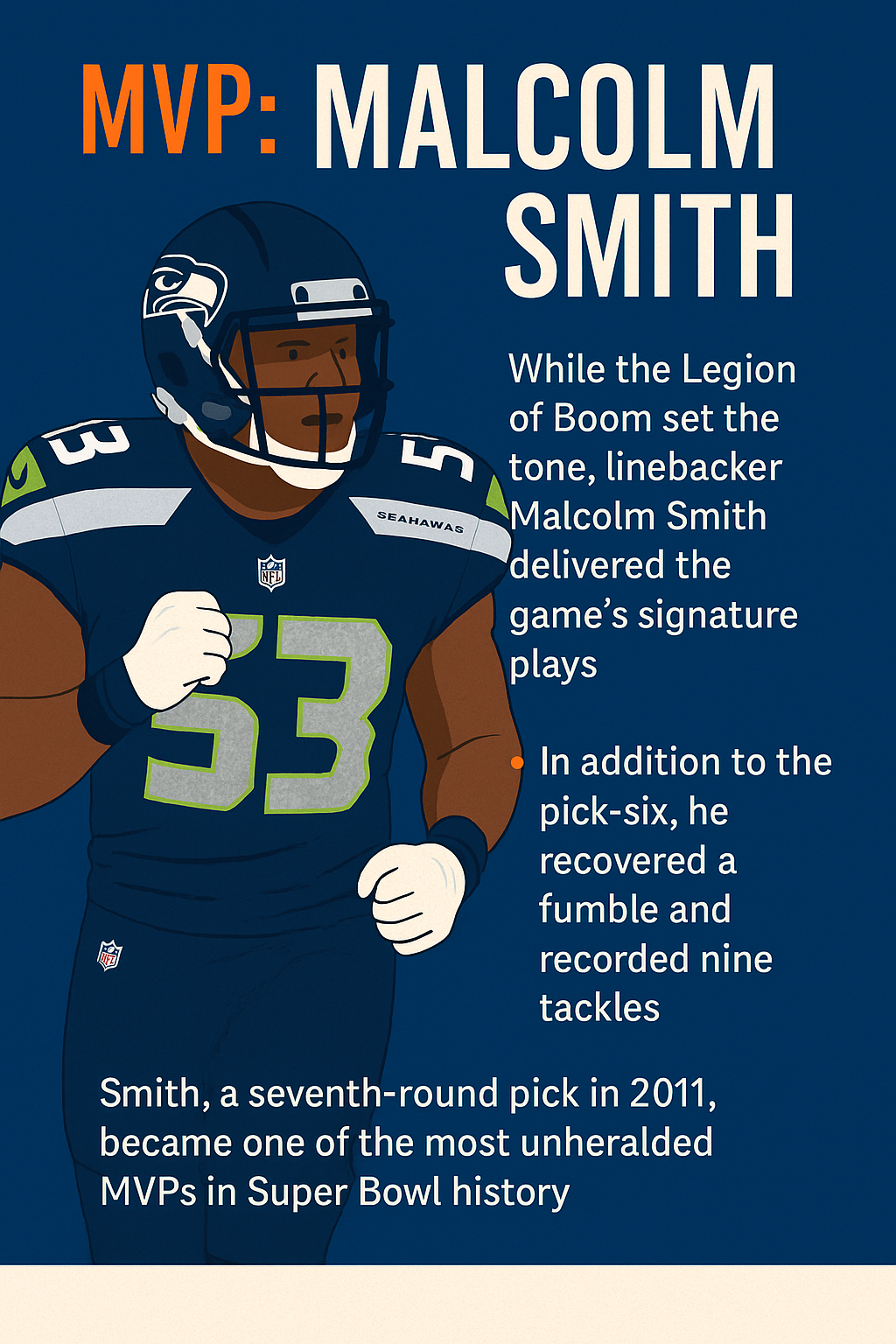Super Bowl XLVIII: Seattle’s Defensive Masterpiece

Super Bowl XLVIII, held on February 2, 2014, at MetLife Stadium in East Rutherford, New Jersey, was expected to be a clash of titans. The Denver Broncos boasted the most prolific offense in NFL history, led by five-time MVP Peyton Manning, while the Seattle Seahawks countered with the league’s top-ranked defense. What unfolded was not the anticipated shootout, but rather a defensive domination by Seattle that stunned the football world.
The Final Score
Seattle Seahawks 43, Denver Broncos 8
From the opening snap — which flew past Peyton Manning into the end zone for a safety — Seattle seized momentum and never looked back. The Seahawks built a 22–0 halftime lead and stretched it to 36–0 before Denver managed a touchdown. This lopsided affair marked one of the most unexpected blowouts in Super Bowl history.
The Defensive Blueprint
Seattle’s “Legion of Boom” secondary, comprised of Richard Sherman, Earl Thomas, Kam Chancellor, and Byron Maxwell, executed a nearly flawless game plan. Backed by a relentless pass rush led by Cliff Avril and Super Bowl MVP Malcolm Smith, the Seahawks dismantled the league’s top-ranked offense. They intercepted Manning twice, forced four turnovers overall, and scored a defensive touchdown.
“Seattle didn’t just win — they erased the line between great defense and dominance,” said Dr. Franklin Mays of the Super Bowl Historical Society. “It was a master class in modern defensive coordination.”
Smith’s pick-six in the second quarter, a 69-yard return, epitomized the Seahawks’ aggressive, opportunistic style. The Broncos looked out of sync, overwhelmed, and unprepared for Seattle’s speed and intensity.
MVP: Malcolm Smith
While the Legion of Boom set the tone, linebacker Malcolm Smith delivered the game's signature plays. In addition to the pick-six, he recovered a fumble and recorded nine tackles. Smith, a seventh-round pick in 2011, became one of the most unheralded MVPs in Super Bowl history.
His performance underscored the depth and talent of a Seattle defense that allowed just 14.4 points per game during the regular season. In the Super Bowl, they were even better.

Offense Plays Its Part
Though defense ruled the night, Seattle’s offense made a statement of its own. Second-year quarterback Russell Wilson played with poise and precision, throwing for 206 yards and two touchdowns on 18-of-25 passing. Marshawn Lynch, the engine of the Seahawks' ground game, chipped in 39 yards and a touchdown, while wide receiver Doug Baldwin led the team with 66 receiving yards and a touchdown.
Yet perhaps the most electric moment came via special teams, when Percy Harvin opened the second half with an 87-yard kickoff return touchdown. It put Seattle ahead 29–0 and all but sealed Denver’s fate.
“The second-half kickoff return by Harvin was the final dagger,” noted Claire Delgado of the Super Bowl Historical Society. “When you dominate on offense, defense, and special teams, that’s not just winning — it’s historic.”
Peyton Manning’s Struggles
Peyton Manning entered Super Bowl XLVIII as the regular season MVP, having set NFL records with 55 touchdown passes and 5,477 passing yards. But the Seahawks completely neutralized him.
Manning finished 34-of-49 for 280 yards, 1 touchdown, and 2 interceptions. While his stat line may not seem disastrous, the majority of his yards came after the game was already decided. His inability to adjust to Seattle’s disguised coverages and relentless pressure led to one of the most humbling losses of his career.
Historical Significance
Super Bowl XLVIII was the first played outdoors in a cold-weather city, but Mother Nature didn’t deliver snow or sleet — just Seattle’s storm of speed and suffocation. The win gave the Seahawks their first NFL championship and catapulted the franchise into the elite ranks of the NFL.
Seattle became just the third team to score a safety, return a kickoff for a touchdown, and return an interception for a touchdown in a single Super Bowl. Their 35-point margin of victory was the third-largest in Super Bowl history.
Legacy of the 2013 Seahawks
This Super Bowl was more than a single victory — it was a validation of a team-building philosophy. The Seahawks’ roster was built on value picks, savvy free-agent signings, and an unwavering belief in competition. Head coach Pete Carroll’s energetic style and GM John Schneider’s front-office acumen created a sustainable blueprint for success.
Key players like Wilson, Sherman, Chancellor, and Thomas were all drafted outside the first round. Their collective chip-on-the-shoulder mentality was evident from the opening whistle.
Seattle’s dominance also reignited the classic NFL debate: “Can defense still win championships in a pass-first era?” Super Bowl XLVIII answered with a resounding yes.
A Turning Point for Denver
For Denver, the loss was catastrophic but ultimately formative. The Broncos returned to the Super Bowl two years later, this time armed with a revitalized defense and a more conservative offensive scheme. Ironically, they won Super Bowl 50 in much the same way Seattle did — with suffocating defense.
But in 2014, the image of Manning being swallowed by the Seahawks’ swarm lingered. The blowout served as a reminder that balance, not just explosive offense, wins titles.
Cultural Impact
Seattle’s win resonated far beyond the Pacific Northwest. It was a triumph for underdogs, late-round picks, and unconventional leadership. The Seahawks' swagger and physicality resonated with fans craving an identity-driven team.
The team’s motto, “Why not us?” became a rallying cry, and their emphatic answer on Super Bowl Sunday etched them into football history.
Closing Thoughts
Super Bowl XLVIII was a moment of revelation — for a team, a city, and the NFL at large. The Seahawks didn’t just beat the Broncos; they shattered the myth that great offense always prevails.
For fans and historians alike, it was a return to the core of football — fierce defense, complete team play, and unrelenting will.
As Dr. Franklin Mays reflected, “In a game defined by flashy stats and offensive records, it was the blue-collar brutality of Seattle that stole the spotlight. They didn’t just win — they changed the narrative.”
